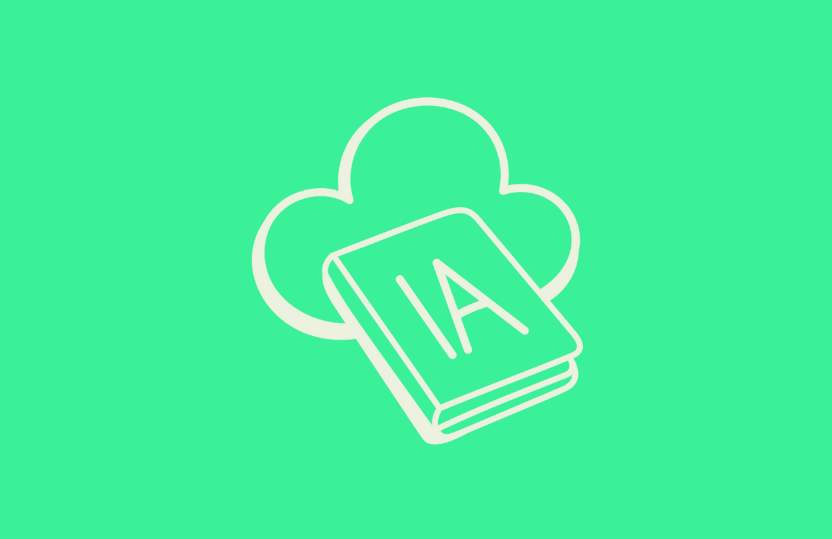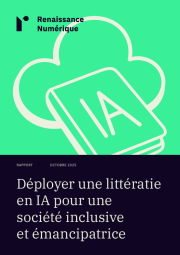Publication 13 October 2025
Developing AI literacy for an inclusive and empowering society

This report is intended for decision-makers and stakeholders who, through their actions and discourse, are shaping the digital transformation of our society. It argues that AI literacy is a democratic, social and economic imperative. Beyond technical skills, AI literacy embodies a social project that places inclusion and citizen empowerment at the heart of digital transformation, creating a bulwark against the depoliticisation of technological choices.
The primary challenge is to reconcile the economic urgency of adoption with the need for critical acculturation over the long term. This tension reveals power relations in which the general interest calls for the preservation of citizens’ intellectual autonomy in the face of strategies to maximise adoption by holders of technological capital.
Generative AI presents a structural duality. On one hand, its natural language interface democratises access to digital tools and opens up opportunities for traditionally excluded audiences. On the other hand, its informed use requires critical knowledge and a variety of skills to avoid dependency, manipulation and the reproduction of biases. To shed more light on the debates surrounding AI, this report clarifies the fundamental concepts of artificial intelligence and explores critical issues (cognitive biases, environmental impacts and speculative dynamics).
The project of a more just, inclusive, democratic and sustainable digital society makes us all responsible.
At the individual level, each decision-maker must adopt a stance of intellectual responsibility: avoiding technological generalisations, demanding and imposing rigorous evaluation, distinguishing between prescription and actual adoption of practices, and viewing literacy as an evolving continuum.
At the collective level, the scale of the transformations requires a coordinated systemic response. The report recommends a paradigm shift in initial training, going beyond simply adding hours of media education to a comprehensive rethinking of school curricula. A national working group under the supervision of the Artificial Intelligence and Digital Council could help define a basis for reflection that integrates social and environmental justice, paving the way for a new national conference on digital technology and AI for education and training. A national skills framework would structure learning pathways based on an assessment grid measuring the impact on reducing inequalities.
Implementation requires enhanced coordination between public and private actors, sustainable funding geared towards inclusion, democratic governance that places citizens at the heart of technological choices, and redistributive mechanisms that direct a portion of AI investments towards the inclusion of all audiences. Support for digital parenting and the maintenance of local mediation complement this approach, drawing on the network of community centers, libraries, fablabs, France Services centers and other structures closest to residents to deploy accessible literacy, with human support adapted to the new challenges of generative AI.
PROPOSALS
PROPOSAL 1
PROPOSAL 2
PROPOSAL 3
PROPOSAL 4
PROPOSAL 5
PROPOSAL 6
PROPOSAL 7
PROPOSAL 8
PROPOSAL 9
PROPOSAL 10
PROPOSAL 11
This report is the result of a working group at Renaissance Numérique, composed of around thirty people, working to fulfil the think tank’s missions and values: diversity, independence, gender diversity, neutrality and rigour.
This work, which took nearly a year to complete, drew on more than twenty hearings, conferences, publications and interventions carried out as part of the think tank’s activities, as well as an extensive bibliography, which was updated during the summer of 2025 in order to produce a report that was as up-to-date as possible.
Renaissance Numérique would like to thank all the co-animators of this working group as well as the rapporteurs who participated in it:
Co-animators of the working group
- CHAGNY Nicolas, Directeur délégué et qualité, CFA numiA. Président, Internet Society (ISOC) France. Membre, Commission Nationale Consultative des Droits de l’Homme (CNCDH)
- ORSINI SHARPS Laetitia, Directrice Grand Public, Orange France
Rapporteurs
- BLONDEL Mélusine, Co-directrice générale, La Mednum. Membre, Conseil d’administration de Renaissance Numérique
- BRUYAS Dorie, Présidente, La Mednum
- COMBLEZ Samuel, Directeur général adjoint, Association e-Enfance / 3018
- GAVEN Frédéric, Fondateur, Nosphi Conseil
- GOMEZ Denis, Directeur de projets Innovation Sociétale, Orange
- Le GOFF Samuel, Président, Renaissance Numérique
- NARZUL Ruben, Membre associé, Renaissance Numérique
- PÉNICAUD Soizic, Consultante en politiques publiques de l’IA. Cofondatrice, Observatoire des algorithmes publics. Enseignante, Sciences Po Paris
- RELTGEN Tangui, Rapporteur, Renaissance Numérique
- SCHOENTGEN Aude, Économiste du numérique. Membre, Conseil d’administration de Renaissance Numérique
-

Publication 17 April 2025
Towards a Global Cooperation Around AI Safety
-
News 14 February 2025

-

Publication 6 February 2025
AI Governance: Empowering Civil Society

